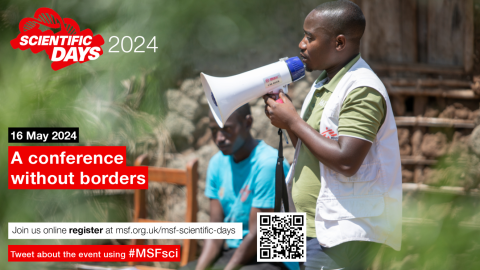MSF Scientific Days: Capturing and sharing research into humanitarian health

RSTMH President Professor Jimmy Whitworth and RSTMH Chief Executive Tamar Ghosh explain why we are partnering with MSF Scientific Days and the importance of humanitarian health research.
At RSTMH we are delighted, once again, to be part of the MSF Scientific Days 2024, an incredible annual event to showcase humanitarian health research. We have been a proud partner to this event for many years, as part of our ongoing relationship with MSF to learn about their work and help ensure their work and learnings are showcased to our members, Fellows and networks through a number of channels.
The MSF Scientific Day, which takes place tomorrow (16 May 2024, both in London and online) is an important date for our calendar, capturing and sharing research into humanitarian health, and the opportunity to hear about recent developments in this field. This year the event is more important than ever as 2024 marks 40 years since the famine in Ethiopia, 30 years since the genocide in Rwanda, both critical events shaping the humanitarian landscape. It also marks the 20-year anniversary of the MSF Scientific Day event and its role in showcasing potential tools and techniques to improve humanitarian health.
Research has too often been seen as a dispensable luxury during disease outbreaks and humanitarian crises. MSF has led the field in showing the essential need to conduct research on, and during, outbreaks and crises so that we gain evidence and knowledge of how to improve our responses in the future. This is increasingly recognized, with Elrha establishing the R2HC (research for health in humanitarian crises) in 2013 and the World Health Organization launching the R&D Blueprint for Action to Prevent Epidemics in 2016.
Champion humanitarian health
At RSTMH, through our Early Career Grants Programme, we have noticed an increase over the last few years in research projects being suggested by first time researchers in humanitarian settings. However, we know there is still so much more to do and we would like to see many more studies focused on this vital area of global health research.
To champion humanitarian health and encourage early career researchers, a few years ago we launched ‘Lessons from the Field’ in our journals, which capture field-based learnings to be shared with the scientific community. These Lessons provide an opportunity for research in complex crisis settings to be captured, published relatively quickly and therefore shared more easily, whether they be full research articles or smaller findings and observations.
'From research trials into development of policy'
This year we are looking forward to hearing at the MSF Scientific Day about studies which capture the journey from research trials into development of policy, guidelines and tools to improve humanitarian health practice, a core theme of the day. At our Annual Meeting in 2023, we were lucky enough to hear from Dr Bern-Thomas Nyang’wa, MSF Holland Medical Director about TB-PRACTECAL, a landmark trial of a four-drug combination treatment for drug resistant tuberculosis, which was designed from the outset to change global treatment guidance for MDR-TB. MSF have committed to transparency on the costs of drug trials and the TB PRACTECAL team will present at the Scientific Days about what this means for research and how this can help push for more accessible treatments.
Innovation to implementation is also a key theme. In particular, we at RSTMH are interested to hear about the Malaria Anticipation Project, using machine learning to support malaria response planning in South Sudan, and how AI can have an impact on humanitarian health. We are currently focused on the topic of AI and will be delivering a webinar on this on 30 May, as well as calling for papers for a special collection on these topics in both of our journals Transactions of the Royal Society of Tropical Medicine and Hygiene and International Health for July 2024.
Other topics we look forward to hearing about include point of care tests, outbreaks, and the repurpose of existing drugs, all topics that we have covered in our Annual Meeting over the last three years.
At RSTMH we have learned at first hand the importance of being able to improve health in settings of humanitarian crisis. Many of our Country Ambassadors, based across the world, have been personally affected and displaced as a result of humanitarian crises, with health impacts for communities at each stage from research to implementation and policy. Thay have talked about the difficulties in continuing research, from the challenges of preserving access to laboratories and samples to the difficulties in completing field studies and ensuring past learnings are taken forwards and converted to change.
The MSF Scientific Days are also launching ‘London Calling’ for MSF, other academic partners and NGOs to recognise the critical value of research in humanitarian settings: to improve and increase access to healthcare, to advocate for policy change, and to capture learnings that can benefit those currently affected, and also those who may be affected in future years, in different settings across the world.